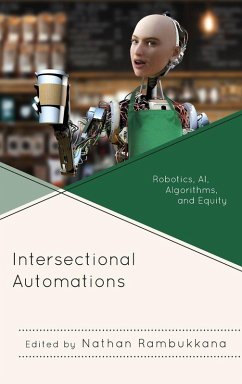Intersectional Automations
Robotics, AI, Algorithms, and Equity
Herausgeber: Rambukkana, Nathan
Intersectional Automations
Robotics, AI, Algorithms, and Equity
Herausgeber: Rambukkana, Nathan
- Gebundenes Buch
- Merkliste
- Auf die Merkliste
- Bewerten Bewerten
- Teilen
- Produkt teilen
- Produkterinnerung
- Produkterinnerung
This book explores a range of situations where robotics, biotechnological enhancement, artificial intelligence (AI), and algorithmic culture collide with intersectional social justice issues such as race, class, gender, sexuality, ability, and citizenship.
Andere Kunden interessierten sich auch für
![Intersectional Humanism and Star Trek Intersectional Humanism and Star Trek]() Alyson R. BuckmanIntersectional Humanism and Star Trek133,99 €
Alyson R. BuckmanIntersectional Humanism and Star Trek133,99 €![Transgender Educators Transgender Educators]() Michele DowTransgender Educators51,99 €
Michele DowTransgender Educators51,99 €![Intersectional Class Struggle Intersectional Class Struggle]() Michael Beyea ReaganIntersectional Class Struggle21,99 €
Michael Beyea ReaganIntersectional Class Struggle21,99 €![Intersectional Experiences and Marginalized Voices Intersectional Experiences and Marginalized Voices]() Intersectional Experiences and Marginalized Voices159,99 €
Intersectional Experiences and Marginalized Voices159,99 €![An Intersectional Approach to Sex Therapy An Intersectional Approach to Sex Therapy]() An Intersectional Approach to Sex Therapy36,99 €
An Intersectional Approach to Sex Therapy36,99 €![Overcoming Exploitation and Externalisation Overcoming Exploitation and Externalisation]() Friederike HabermannOvercoming Exploitation and Externalisation61,99 €
Friederike HabermannOvercoming Exploitation and Externalisation61,99 €![Queer, Trans, and Intersectional Theory in Educational Practice Queer, Trans, and Intersectional Theory in Educational Practice]() Queer, Trans, and Intersectional Theory in Educational Practice64,99 €
Queer, Trans, and Intersectional Theory in Educational Practice64,99 €-
-
-
This book explores a range of situations where robotics, biotechnological enhancement, artificial intelligence (AI), and algorithmic culture collide with intersectional social justice issues such as race, class, gender, sexuality, ability, and citizenship.
Hinweis: Dieser Artikel kann nur an eine deutsche Lieferadresse ausgeliefert werden.
Hinweis: Dieser Artikel kann nur an eine deutsche Lieferadresse ausgeliefert werden.
Produktdetails
- Produktdetails
- Verlag: Lexington Books
- Seitenzahl: 282
- Erscheinungstermin: 29. Juni 2021
- Englisch
- Abmessung: 235mm x 157mm x 20mm
- Gewicht: 554g
- ISBN-13: 9781793620514
- ISBN-10: 1793620512
- Artikelnr.: 61440403
- Herstellerkennzeichnung
- Libri GmbH
- Europaallee 1
- 36244 Bad Hersfeld
- gpsr@libri.de
- Verlag: Lexington Books
- Seitenzahl: 282
- Erscheinungstermin: 29. Juni 2021
- Englisch
- Abmessung: 235mm x 157mm x 20mm
- Gewicht: 554g
- ISBN-13: 9781793620514
- ISBN-10: 1793620512
- Artikelnr.: 61440403
- Herstellerkennzeichnung
- Libri GmbH
- Europaallee 1
- 36244 Bad Hersfeld
- gpsr@libri.de
Nathan Rambukkana is assistant professor in communication studies at Wilfrid Laurier University.
Acknowledgments
Introduction
Part 1: Algorithms, Machine Learning, and Inequality
Chapter 1Blind Trust, Algorithmic Discrimination, and Self-Regulation in
Facebook Advertisements by Chloé L. Nurik
Chapter 2Faking Age? Ageing and the Algorithmic Assemblage by Maude
Gautier, Kim Sawchuk, and Scott DeJong
Chapter 3It Was All Fun and Games: Gamewashing Automated Control by
Sebastián Gómez
Chapter 4From Automating to Informating: Toward a Productive Model of
Human/Machine Collaboration in Higher Education by Jordan Canzonetta
Part 2: Robots and Social Justice
Chapter 5The Misogyny of Transhumanism by Nikila Lakshmanan
Chapter 6Are We All Too Human? Toward an Understanding of Posthumanism and
Rights by Julia A. Empey
Chapter 7Being Sophia: What Makes the World's First Robot Citizen? by
Madelaine Ley
Chapter 8Robosexuality and Its Discontents by Nathan Rambukkana
Chapter 9Robots as Caretakers: Understanding Long-Term Relationships
Between Humans and Carebots by Jamie Foster Campbell and Kristina M. Green
Part 3: Posthuman Fictions, Futures, and Bodies
Chapter 10Im/Material Bodies: Queering Embodiment Through Performance Art
and Technology" by Joep Bouma
Chapter 11Estranged World: Tenets of Xenofeminism and Tropes of Automated
Alienation in Contemporary Alien Films by Christopher M. Cox
Chapter 12Simulation and Synesthesia in Rez: Virtual Reality and the Queer
Erotechnics of Becoming-Machinic by Tobias C. van Veen
About the Contributors
Introduction
Part 1: Algorithms, Machine Learning, and Inequality
Chapter 1Blind Trust, Algorithmic Discrimination, and Self-Regulation in
Facebook Advertisements by Chloé L. Nurik
Chapter 2Faking Age? Ageing and the Algorithmic Assemblage by Maude
Gautier, Kim Sawchuk, and Scott DeJong
Chapter 3It Was All Fun and Games: Gamewashing Automated Control by
Sebastián Gómez
Chapter 4From Automating to Informating: Toward a Productive Model of
Human/Machine Collaboration in Higher Education by Jordan Canzonetta
Part 2: Robots and Social Justice
Chapter 5The Misogyny of Transhumanism by Nikila Lakshmanan
Chapter 6Are We All Too Human? Toward an Understanding of Posthumanism and
Rights by Julia A. Empey
Chapter 7Being Sophia: What Makes the World's First Robot Citizen? by
Madelaine Ley
Chapter 8Robosexuality and Its Discontents by Nathan Rambukkana
Chapter 9Robots as Caretakers: Understanding Long-Term Relationships
Between Humans and Carebots by Jamie Foster Campbell and Kristina M. Green
Part 3: Posthuman Fictions, Futures, and Bodies
Chapter 10Im/Material Bodies: Queering Embodiment Through Performance Art
and Technology" by Joep Bouma
Chapter 11Estranged World: Tenets of Xenofeminism and Tropes of Automated
Alienation in Contemporary Alien Films by Christopher M. Cox
Chapter 12Simulation and Synesthesia in Rez: Virtual Reality and the Queer
Erotechnics of Becoming-Machinic by Tobias C. van Veen
About the Contributors
Acknowledgments
Introduction
Part 1: Algorithms, Machine Learning, and Inequality
Chapter 1Blind Trust, Algorithmic Discrimination, and Self-Regulation in
Facebook Advertisements by Chloé L. Nurik
Chapter 2Faking Age? Ageing and the Algorithmic Assemblage by Maude
Gautier, Kim Sawchuk, and Scott DeJong
Chapter 3It Was All Fun and Games: Gamewashing Automated Control by
Sebastián Gómez
Chapter 4From Automating to Informating: Toward a Productive Model of
Human/Machine Collaboration in Higher Education by Jordan Canzonetta
Part 2: Robots and Social Justice
Chapter 5The Misogyny of Transhumanism by Nikila Lakshmanan
Chapter 6Are We All Too Human? Toward an Understanding of Posthumanism and
Rights by Julia A. Empey
Chapter 7Being Sophia: What Makes the World's First Robot Citizen? by
Madelaine Ley
Chapter 8Robosexuality and Its Discontents by Nathan Rambukkana
Chapter 9Robots as Caretakers: Understanding Long-Term Relationships
Between Humans and Carebots by Jamie Foster Campbell and Kristina M. Green
Part 3: Posthuman Fictions, Futures, and Bodies
Chapter 10Im/Material Bodies: Queering Embodiment Through Performance Art
and Technology" by Joep Bouma
Chapter 11Estranged World: Tenets of Xenofeminism and Tropes of Automated
Alienation in Contemporary Alien Films by Christopher M. Cox
Chapter 12Simulation and Synesthesia in Rez: Virtual Reality and the Queer
Erotechnics of Becoming-Machinic by Tobias C. van Veen
About the Contributors
Introduction
Part 1: Algorithms, Machine Learning, and Inequality
Chapter 1Blind Trust, Algorithmic Discrimination, and Self-Regulation in
Facebook Advertisements by Chloé L. Nurik
Chapter 2Faking Age? Ageing and the Algorithmic Assemblage by Maude
Gautier, Kim Sawchuk, and Scott DeJong
Chapter 3It Was All Fun and Games: Gamewashing Automated Control by
Sebastián Gómez
Chapter 4From Automating to Informating: Toward a Productive Model of
Human/Machine Collaboration in Higher Education by Jordan Canzonetta
Part 2: Robots and Social Justice
Chapter 5The Misogyny of Transhumanism by Nikila Lakshmanan
Chapter 6Are We All Too Human? Toward an Understanding of Posthumanism and
Rights by Julia A. Empey
Chapter 7Being Sophia: What Makes the World's First Robot Citizen? by
Madelaine Ley
Chapter 8Robosexuality and Its Discontents by Nathan Rambukkana
Chapter 9Robots as Caretakers: Understanding Long-Term Relationships
Between Humans and Carebots by Jamie Foster Campbell and Kristina M. Green
Part 3: Posthuman Fictions, Futures, and Bodies
Chapter 10Im/Material Bodies: Queering Embodiment Through Performance Art
and Technology" by Joep Bouma
Chapter 11Estranged World: Tenets of Xenofeminism and Tropes of Automated
Alienation in Contemporary Alien Films by Christopher M. Cox
Chapter 12Simulation and Synesthesia in Rez: Virtual Reality and the Queer
Erotechnics of Becoming-Machinic by Tobias C. van Veen
About the Contributors








